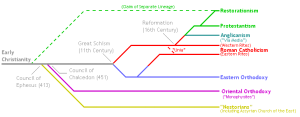Denominations
|
The 'outsider' who knows nothing of the mixture of tradition, conviction, honest difference, and hidden resentment, that lies behind the divisions of the Christian Church sees clearly the advantage of a united Christian front and cannot see why the Churches cannot 'get together'. The problem is doubtless complicated, for there are many honest differences held with equal sincerity, but it is only made insoluble because the different denominations are (possibly unconsciously) imagining God to be Roman or Anglican or Baptist or Methodist or Presbyterian or what have you. (J.B. Phillips)
|
| Denominations | |
| RELATED TOPICS | |
| SERMONS, ESSAYS AND OPINIONS | |
| CONTENTS | |
Although there is only one universal Christian Church, there are tens of thousands of Christian branches of Christianity. These branches of Christianity are referred to as denominations. These denominations have formed and divided since the time of Christ, because Christians have had differences in beliefs and practices. Some of the main groups include Eastern Orthodoxy, Roman Catholicism and the Protestant churches and Pentecostal churches.
Roman Catholicism
The Roman Catholic Church is a major Christian denomination. It's head-quarters are in Rome but it has congregations throughout the world. It claims to have an unbroken leadership first from Jesus Christ, through the apostle Peter to the pope by Apostolic Succession.
Eastern Orthodoxy
The Eastern Orthodox Church is a body of Christians that claims origins extending directly back to Jesus and his Apostles through unbroken Apostolic Succession. Its doctrines were formalized through a series of church councils in the following centuries. Toward the end of its first thousand years of existence differences developed between the Church in the Eastern and Western Roman Empire that ultimately led to the Great Schism in 1054 dividing Christianity into Roman Catholicism and Eastern Orthodoxy. Today the Eastern Orthodox Church includes the various national churches of Eastern Europe such as the Greek Orthodox Church and Russian Orthodox churches, and maintains a strong presence in these ethnic communities in countries such as the United States and Australia.
Oriental Orthodoxy
The Oriental Orthodox Communion refers to the churches of Eastern Christian traditions that keep the faith of only the first three ecumenical councils and reject the the Council of Chalcedon. Thus, despite potentially confusing nomenclature, Oriental Orthodox churches are distinct from the churches that collectively refer to themselves as Eastern Orthodoxy. The Oriental Orthodox churches came to a parting of the ways with the remainder of Christianity in the 5th century. The key difference was the views of the Council of Chalcedon in 451. The separation resulted in part from the Oriental Orthodox churches' refusal to accept the view that Jesus has two natures, one divine and one human, as had been defined by the Council of Chalcedon (Fourth Ecumenical Council) of 451. Instead, the churches used the terminology of Miaphysitism which said that Jesus Christ is fully human and fully divine in one nature or "physis". The Oriental Churches include the Armenian Apostolic Church, Coptic Orthodox Church and the Syrian Orthodox Church.
Assyrian Church of the East
The Holy Apostolic and Catholic Assyrian Church of the East is a church that traces its origins to the See of Babylon, said to be founded by the apostle Thomas. It is also called the Assyrian Orthodox Church, but should not be confused with the distinct Syriac Orthodox Church, which belongs to Oriental Orthodoxy. Its geographical origins lie in Iraq and Iran and it onced stretched to Xian in China and Kerala in India. It officially divided from the other Christian churches in 431 AD following the Council of Ephesus which repudiated Nestorianism and as such it is often known as the Nestorian Church, however its theology is not strictly Nestorian. Today there are about 5 million members of the church, of which most live in Iraq, Iran, Syria and Lebanon.
Protestantism
Protestantism is a movement within Christianity, representing a split from the Roman Catholic Church that occurred during the sixteenth century in Europe — a period known as the Protestant Reformation. The split occurred primarily over issues of doctrine, especially the issue of Justification by faith versus Justification by faith plus works. Some of the main Protestant church denominations today include the Lutheran Church, Anglican Communion and the Baptist Church.
Pentecostalism
The Pentecostal movement within Christianity places special emphasis on the gifts of the Holy Spirit, especially talking in tongues. Some Pentecostals believe that belief in Christ and salvation is always accompanied initially by the outward evidence of speaking in tongues. Some of the main Pentecostal denominations today include the Assemblies of God, the Church of God in Christ and the Pentecostal Assemblies of the World.
Quotes
- The 'outsider' who knows nothing of the mixture of tradition, conviction, honest difference, and hidden resentment, that lies behind the divisions of the Christian Church sees clearly the advantage of a united Christian front and cannot see why the Churches cannot 'get together'. The problem is doubtless complicated, for there are many honest differences held with equal sincerity, but it is only made insoluble because the different denominations are (possibly unconsciously) imagining God to be Roman or Anglican or Baptist or Methodist or Presbyterian or what have you. If they could see beyond their little inadequate god, and glimpse the reality of God, they might even laugh a little and perhaps weep a little. The result would be a unity that actually does transcend differences, instead of ignoring them with public politeness and private contempt.
Return to Christianity -> Church
Note to users: The wiki is currently operating in safe mode. Editing is limited to users with certain privileges in order to deal with spam. You can create a new user account, and confirm your email ID in order to obtain ability to edit pages. Learn how to be an editor or sysop at WikiChristian.
- Sister projects: WikiMD.com Wellness Encyclopedia & Directory
- Sponsors: WikiChristian is supported by W8MD's medical weight loss and sleep centers.

